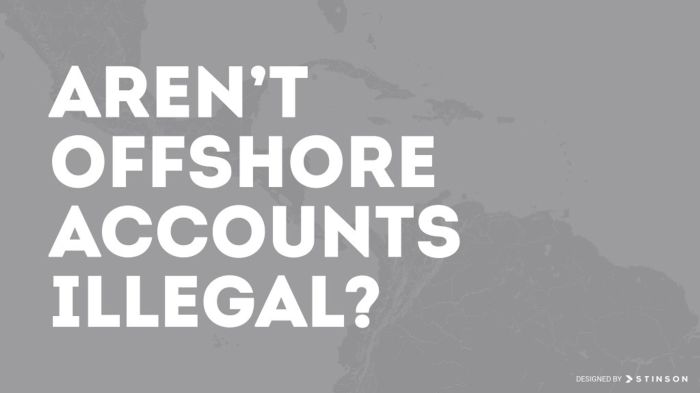Offshore Accounts Illegal? The world of offshore banking is shrouded in both mystique and misunderstanding. While often associated with illicit activities, many legitimate businesses and individuals utilize offshore accounts for perfectly legal reasons. This guide delves into the complexities of offshore accounts, separating fact from fiction and illuminating the legal framework that governs their use. We’ll explore the benefits, risks, and regulatory requirements, providing a clear understanding of when offshore accounts are legal and when they cross the line into illegality.
Understanding the nuances of international tax laws and financial regulations is crucial. We’ll examine specific examples of countries with varying degrees of regulatory oversight, highlighting the critical distinction between legal tax optimization and illegal tax evasion. The guide will also address common misconceptions surrounding offshore accounts, dispelling myths and providing clarity on legitimate business practices that involve offshore banking.
Legality of Offshore Accounts

The legality of offshore accounts is a complex issue, varying significantly depending on the jurisdiction involved and the purpose for which the account is used. While offshore accounts themselves are not inherently illegal, their use can be subject to stringent regulations and legal consequences if used for illicit activities such as tax evasion or money laundering. Understanding the legal framework governing these accounts is crucial for individuals and businesses considering their use.
Legal Frameworks Governing Offshore Accounts
Different countries have established varying legal frameworks regarding offshore accounts. These frameworks encompass regulations concerning taxation, anti-money laundering (AML), and know-your-customer (KYC) compliance. Some jurisdictions maintain strict regulatory environments, demanding extensive documentation and transparency, while others offer more lenient regulatory frameworks, attracting individuals and businesses seeking greater financial privacy. The specific regulations within each jurisdiction influence the legal implications of holding and utilizing offshore accounts.
Non-compliance with these regulations can lead to severe penalties, including hefty fines and even imprisonment.
Examples of Jurisdictions with Varying Regulations
Countries like the United Kingdom and the United States have robust regulatory frameworks for offshore accounts, demanding strict compliance with reporting requirements and anti-money laundering regulations. These jurisdictions actively collaborate internationally to combat financial crimes and tax evasion related to offshore accounts. In contrast, some jurisdictions, often referred to as tax havens, maintain less stringent regulations, potentially offering greater financial privacy but also carrying higher risks of non-compliance and legal repercussions.
The Cayman Islands and the British Virgin Islands are frequently cited examples of jurisdictions with more lenient regulatory environments. It is crucial to understand that the term “tax haven” itself is not inherently negative; it simply refers to a jurisdiction with lower tax rates than others. The illegality arises when individuals or entities use these lower tax rates to evade their legitimate tax obligations in their home country.
Legal Tax Optimization versus Illegal Tax Evasion
The distinction between legal tax optimization and illegal tax evasion is paramount. Legal tax optimization involves utilizing legal means to minimize one’s tax liability within the confines of the law. This can include structuring investments or utilizing legal tax deductions to reduce the overall tax burden. In contrast, illegal tax evasion involves actively attempting to conceal income or assets from tax authorities, often using offshore accounts to avoid paying taxes legitimately owed.
The use of offshore accounts for tax evasion is a serious crime with severe legal ramifications, including significant fines and imprisonment.
Legal Implications of Holding Assets in Offshore versus Domestic Accounts
The legal implications of holding assets in offshore accounts versus domestic accounts differ primarily in the area of reporting and transparency. Domestic accounts are generally subject to stricter reporting requirements and oversight by domestic tax authorities. Offshore accounts, depending on the jurisdiction, may require reporting to both the offshore jurisdiction and the individual’s home country. Failure to comply with these reporting requirements can lead to penalties in both jurisdictions.
Furthermore, the level of privacy offered by offshore accounts is generally lower than that of domestic accounts due to increased international cooperation in combating financial crime.
Comparison of Tax Laws Related to Offshore Accounts, Offshore Accounts Illegal
| Country | Reporting Requirements | Tax Rates on Offshore Income | Penalties for Non-Compliance |
|---|---|---|---|
| United States | Strict reporting requirements under the Foreign Account Tax Compliance Act (FATCA) | Taxed as ordinary income | Significant fines and potential criminal charges |
| United Kingdom | Mandatory disclosure of offshore income and assets | Taxed based on residency and source of income | High penalties, including imprisonment |
| Cayman Islands | No direct taxation on offshore income for non-residents | No direct tax on offshore income for non-residents | Penalties for non-compliance with AML/KYC regulations |
Risks and Penalties Associated with Illegal Offshore Accounts: Offshore Accounts Illegal
The use of offshore accounts for illegal purposes carries significant risks and severe penalties. These consequences extend beyond financial repercussions, encompassing legal ramifications that can severely impact individuals and businesses. Understanding these risks is crucial for anyone considering offshore financial arrangements. Failure to comply with international and domestic laws governing offshore accounts can lead to substantial fines, imprisonment, and reputational damage.
Individuals and businesses found guilty of using offshore accounts for illegal activities face a wide range of penalties, the severity of which depends on the nature and scale of the offense. These penalties can include substantial financial fines, lengthy prison sentences, and the seizure of assets linked to the illegal activities. Furthermore, the reputational damage caused by association with such crimes can be devastating, leading to the loss of business opportunities and social standing.
Examples of Real-World Cases
Several high-profile cases illustrate the severe consequences of using offshore accounts for illegal purposes. For instance, the case of [insert name of a real-world case and a brief description, citing the source]. This case highlights the thorough investigations conducted by international authorities and the significant penalties imposed on those found guilty. Another example involves [insert name of a second real-world case and a brief description, citing the source].
This case underscores the global reach of investigations into offshore financial crimes and the collaborative efforts of various jurisdictions in bringing offenders to justice. These examples demonstrate the serious legal and financial repercussions associated with illegal offshore activities.
Investigation and Prosecution Process
Investigations into offshore account-related crimes often involve complex international collaborations between law enforcement agencies and tax authorities. The process typically begins with a trigger event, such as a whistleblower report, a suspicious transaction report, or information obtained through international cooperation agreements. Investigators utilize various techniques, including financial analysis, data mining, and international legal assistance, to trace the flow of funds and identify individuals involved in the illegal activities.
Prosecution may involve multiple jurisdictions, necessitating international cooperation and the harmonization of legal frameworks. The process can be lengthy and resource-intensive, reflecting the complexity of uncovering and prosecuting these crimes.
Types of Financial Penalties and Legal Repercussions
The financial penalties associated with illegal offshore account use can be substantial. These penalties include hefty fines, often calculated as a percentage of the funds involved in the illegal activity, or as a multiple of the tax evaded. Furthermore, governments may seize assets linked to the illegal activity, including bank accounts, properties, and other valuable possessions. Beyond financial penalties, individuals and businesses can face criminal charges, leading to imprisonment, probation, and other legal sanctions.
The severity of these repercussions depends on the specific offense, the jurisdiction involved, and the individual’s or business’s level of culpability. In addition to criminal penalties, civil penalties such as back taxes, interest, and penalties can be imposed. The reputational damage associated with such convictions can also lead to significant long-term consequences.
Reporting Requirements and Due Diligence

The use of offshore accounts, while legal in many circumstances, is subject to stringent reporting requirements and due diligence procedures designed to prevent financial crimes like money laundering and tax evasion. Understanding these requirements is crucial for individuals and businesses to maintain compliance and avoid severe penalties. Failure to meet these obligations can lead to significant legal and financial repercussions.The complexity of reporting requirements varies considerably depending on the jurisdiction of both the account holder and the financial institution holding the account, as well as the nature of the funds involved.
International agreements, such as the Common Reporting Standard (CRS), have significantly increased the level of information exchange between tax authorities globally, making it harder to conceal assets or income.
Reporting Requirements for Individuals and Businesses
Individuals and businesses with offshore accounts are generally required to report their holdings to their respective tax authorities. These reporting requirements often involve disclosing the existence of the account, the balance, and any transactions exceeding specified thresholds. Specific reporting forms and deadlines vary widely by country. For example, in the United States, the Foreign Bank Account Report (FBAR) requires US citizens and residents with foreign financial accounts exceeding $10,000 at any point during the year to file an annual report with the Financial Crimes Enforcement Network (FinCEN).
Similarly, many other countries have implemented similar reporting requirements under the CRS or equivalent legislation. Failure to comply can result in significant fines and even criminal prosecution. Businesses often face more extensive reporting requirements, needing to detail the purpose of the accounts, the nature of the transactions, and the beneficial ownership structure.
Due Diligence in Preventing Illegal Activities
Financial institutions play a critical role in preventing the use of offshore accounts for illegal purposes. They are obligated to conduct thorough due diligence on their clients, verifying their identity, source of funds, and the intended use of the accounts. This process often involves obtaining supporting documentation, such as proof of address, identification documents, and explanations of the funds’ origin.
Know Your Customer (KYC) and Anti-Money Laundering (AML) regulations mandate this due diligence. Sophisticated techniques, including transaction monitoring and risk assessment, are employed to identify suspicious activity. For example, a sudden influx of large cash deposits from an unknown source would trigger further scrutiny.
Best Practices for Compliance
Maintaining meticulous records of all offshore account transactions is paramount. This includes keeping copies of bank statements, transaction confirmations, and any other relevant documentation. Regularly reviewing these records for accuracy and completeness helps ensure compliance. Seeking professional advice from tax advisors and legal experts specializing in international taxation and offshore accounts is highly recommended. These professionals can provide guidance on specific reporting requirements and help navigate the complexities of international regulations.
Transparency and proactive engagement with tax authorities are crucial in demonstrating compliance. Proactively addressing any potential discrepancies or irregularities avoids escalation into more serious issues.
Checklist for Offshore Account Compliance
Ensuring compliance with offshore account regulations requires a proactive approach. The following checklist provides key steps for individuals and businesses:
- Maintain accurate and complete records of all transactions.
- Understand and comply with all relevant reporting requirements in your jurisdiction and the jurisdiction of the offshore account.
- Obtain professional advice from tax and legal experts familiar with international regulations.
- Conduct thorough due diligence on any financial institution managing offshore accounts.
- Implement robust internal controls to prevent and detect suspicious activity.
- File all required reports accurately and on time.
- Regularly review and update your compliance procedures to reflect changes in regulations.
- Cooperate fully with any inquiries or investigations from tax authorities.
Navigating the world of offshore accounts requires careful consideration of legal and regulatory frameworks. While offering potential benefits like asset protection and diversification, they also carry significant risks and potential penalties for non-compliance. By understanding the legal distinctions between legitimate and illicit use, individuals and businesses can make informed decisions and ensure compliance with international regulations. This guide serves as a starting point for a more thorough investigation into your specific circumstances, and consulting with legal and financial professionals is always recommended when dealing with complex international financial matters.

